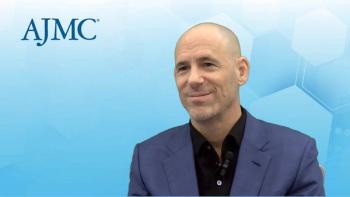
Mila Felder, MD, FACEP, emergency physician and vice president for Well-Being for All Teammates, Advocate Health, shares insights on how peer support groups can help manage psychological and emotional distress amid a national drug shortage.

Mila Felder, MD, FACEP, emergency physician and vice president for Well-Being for All Teammates, Advocate Health, shares insights on how peer support groups can help manage psychological and emotional distress amid a national drug shortage.

Krystyn Van Vliet, PhD, of Cornell University, discusses the scalability of 3D platforms in multiple sclerosis (MS) drug discovery and compares their costs with those of other drug discovery methods.

The annual legislative update at the Community Oncology Alliance Community Oncology Conference identified what Congress may focus on prior to the upcoming election.

This panel at the Community Oncology Alliance conference discussed the impact of pharmacy benefit manager (PBM) response to the end of direct and indirect remuneration fees, which has been dramatic cuts to cancer drug reimbursement.

"The government really didn't rise to the challenge the way that it should have,” notes Ben Jones, vice president of government relations and public policy for The US Oncology Network. “Practices were in distress…stretching all resources to figure out workarounds."

Kathy Oubre, MS, CEO of Pontchartrain Cancer Center, is 1 of 6 cochairs for the 2024 Community Oncology Conference, and here she discusses how meeting content has incorporated ongoing coverage of the extremely disruptive cyberattack and how there is still so much work to be done.

Jonathan E. Levitt, Esq, founding partner of boutique health care law firm Frier Levitt, LLC, discusses a recent class-action lawsuit brought against Johnson & Johnson in which an employee alleged a breach of fiduciary duty regarding her employer-sponsored pharmacy benefits.

Judy Alberto, MHA, RPh, BCOP, director of clinical initiatives at the Community Oncology Alliance (COA), addresses the challenges pharmacies face in managing formularies to provide optimal patient care.

After the end of the Oncology Care Model (OCM), practices are working with primary care providers, which has pros and cons.

A lawsuit that followed a health system revoking community oncologists' hospital privileges was the jumping off point for a discussion of how to manage this key relationship.

Mila Felder, MD, FACEP, emergency physician and vice president for Well-Being for All Teammates, Advocate Health, discusses the impact of peer support groups within a health care organization and its patients.

Monica Li, MD, medical and cosmetic dermatologist, listed microneedling considerations and precautions so that providers can safely implement the procedure.

Jonathan Silverberg, MD, PhD, MPH, FAAD, of George Washington University School of Medicine and Health Sciences, discusses atopic dermatitis (AD) diagnosis and treatment differences in children vs adults.

Raj Chovatiya, MD, PhD, associate professor at the Rosalind Franklin University of Medicine and Science, described monitoring protocols for clinicians when using oral Janus kinase (JAK) inhibitors to treat patients with atopic dermatitis (AD).

Despite the positive week 48 results when used to treat moderate to severe hidradenitis suppurativa (HS), Jeff Stark, MD, of Union Chimique Belge, noted that bimekizumab is still considered an investigational therapy for HS treatment as it has not yet received an FDA approval.

The annual Community Oncology Conference comes on the heels of a cyberattack that has caused significant disruption to providers, and many have sought relief from payers in areas such as prior authorization.

With the 2024 Community Oncology Conference, from the Community Oncology Alliance (COA), set to kick off this week in Orlando, Florida, The American Journal of Managed Care® spoke with Emily Touloukian, DO, COA board member and 1 of 6 cochairs for this year’s meeting, on highlights from the packed agenda and the power of advocacy.

An abstract presented at the 2024 Society of Gynecologic Oncology Annual Meeting on Women’s Cancer explored patient-reported health-related quality of life (HRQOL) among patients treated with mirvetuximab soravtansine compared with standard chemotherapy.

The often-overlooked perspective of the caregiver was brought to the forefront of a presentation by Julia Cohen Sebastien at the Greater Philadelphia Business Coalition on Health 2024 Women’s Health Summit.

Posters presented at the American Academy of Dermatology Annual Meeting identified significant undertreatment of psoriasis and significant gaps in biologic medication treatment.

A presentation at the Greater Philadelphia Business Coalition on Health's 2024 Women’s Health Summit discussed how payers, including employers and public entities, can strategically influence health care purchasing to prioritize maternal health and equity.

Raj Chovatiya, MD, PhD, associate professor at the Rosalind Franklin University of Medicine and Science, provided current clinical evidence supporting the use of oral Janus kinase (JAK) inhibitors to treat patients with atopic dermatitis (AD).

This poster reported that photoprotection management of lupus is unaffordable for some patients, which may have an impact on sunscreen application frequency.

These posters both used the GLOBOSTAD study, which demonstrated through patient and physician assessments that dupilumab is a safe and effective treatment for adolescent and adult patients with atopic dermatitis (AD).

Posters presented at the American Academy of Dermatology 2024 Annual Meeting identified significant health disparities among patients living in rural areas and those with skin of color (SOC).

Posters reported the prevalence of autoimmune comorbidities among patients with vitiligo, demonstrating the need for earlier screenings and updated clinical guidelines.

Based on the findings, investigators acknowledged the critical need to consider racial differences when assessing patients with hidradenitis suppurativa. Health care providers should be vigilant in addressing cardiovascular risk factors in this population, recognizing and addressing racial disparities that may impact disease management.

Posters presented showed that patients with vitiligo have a heightened risk of stigma and subsequent mental health issues.

Posters presented at the American Academy of Dermatology Annual Meeting demonstrated both short- and long-term efficacy and safety profiles of brodalumab in patients with moderate to severe psoriasis.

Shawn Kwatra, MD, dermatologist, John Hopkins University, discusses late breaking study results on the long-term efficacy and safety of nemolizumab in patients with prurigo nodularis (PN).

259 Prospect Plains Rd, Bldg H
Cranbury, NJ 08512
© 2025 MJH Life Sciences®
All rights reserved.
